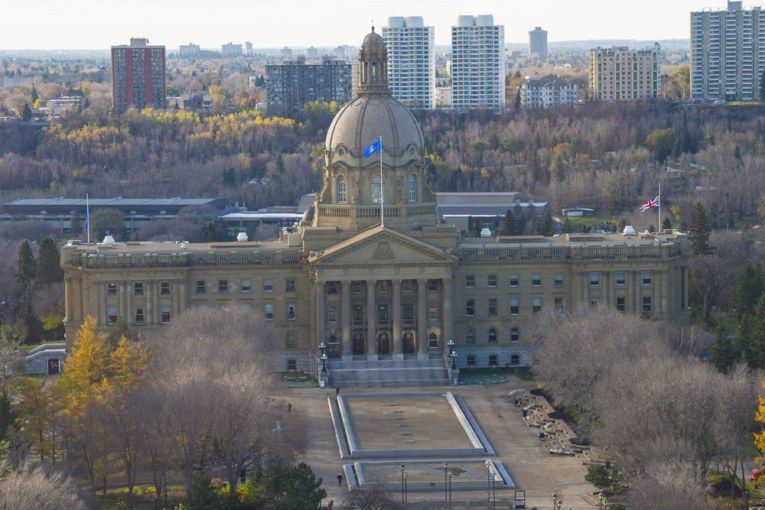
With Alberta’s annual budget deficit near $7 billion and overall debt levels chugging toward $95 billion, business groups are calling for the next provincial government to “clean up” its fiscal house.
But we’re in election mode today.
The campaign has already triggered billions of dollars in spending pledges and tax cuts.
And there are still more than two weeks of campaigning to come.
Against this backdrop, the Calgary and Edmonton Chambers of Commerce joined forces Thursday, wading into political waters to say whoever wins, they must develop a detailed financial blueprint that reins in “mounting provincial debt and deficits or Albertans’ vital services will be at risk.”
In their declaration, they want the government to limit spending, benchmark its services and costs against other provinces and reduce its reliance on oil and gas royalties.
During a spending spree, it’s tough to preach a message of restraint.
Yet, it’s a message that needs to be heard.
“This mounting debt is going to do nothing but be a burden for future generations,” said Janet Riopel, CEO of the Edmonton chamber.
“It’s really now starting, I would say, to threaten businesses with a growing risk that taxes are going to be raised, because governments are going to need more revenue.”
Indeed, Alberta’s finances remain a concern for business leaders as the campaign grinds through its second week.
They fret about rising debt levels and its potential impact on pushing taxes higher, as well as the effect it could have on the investment climate.
As provincial spending grows — topping $56 billion this year — and deficits mount, Alberta faces debt-servicing costs of $1.9 billion this year.
For a little bit of perspective, this is bigger than the individual departmental operating budgets for Children’s Services, Agriculture or Justice.
According to the province’s third-quarter budget update, Alberta’s fiscal and capital plan debt levels are estimated to hit $58.6 billion by the end of this month.
The NDP government’s “path to balance” plan estimates that number will climb to $94.8 billion by the time Alberta finally records a budget surplus in 2023-24.
The United Conservative Party has vowed to balance the books a year earlier, while the Alberta Party promises to record a budget surplus by 2023.
“Debt and deficits are a key concern for the business community because it does impact the competitiveness of the business environment,” said Sandip Lalli, head of the Calgary chamber.
“It impacts investment into our respective cities.”
 Calgary Chamber of Commerce president Sandip Lalli wants more focus on debt reduction in the provincial election.
Calgary Chamber of Commerce president Sandip Lalli wants more focus on debt reduction in the provincial election.
It’s no secret investment levels have been tepid, particularly in the energy sector due to weak commodity prices and pipeline constraints.
Spending is also a key concern.
Lalli points out if provincial spending from 2015 onward had simply kept pace with inflation and population growth, it would be $2 billion less by the end of this year.
Alberta business groups want to see detailed spending platforms from all the parties in the coming days and believe more attention needs to be paid to the province’s financial challenges.
“I haven’t been very impressed on the amount of detail and haven’t been impressed with the economic platforms from the parties,” said Richard Truscott of the Canadian Federation of Independent Business.
“How the heck will they pay for it all?”
Fortunately, the province still has the lowest taxes and lowest debt-to-GDP ratio in the country to lean on.
The deficit has been falling throughout this budget year, down $1.9 billion since last spring to a forecast $6.9 billion.
“From a credit perspective, the province continues to trend slowly in the right direction,” said Adam Hardi, a vice-president with Moody’s Investors Service.
However, the Alberta economy remains sluggish and is expected to see limited growth this year.
One of the province’s biggest financial issues is the rate at which the overall debt is increasing.
“Alberta was head and shoulders above the rest of the pack and it’s becoming less so every year,” said Robert Kavcic, BMO Capital Markets senior economist.
The debate comes as more promises emerge on the campaign trail.
The UCP has said it will cut the corporate income tax level to eight per cent from 12 if elected, and announced Thursday it will set aside $100 million in funding for a new mental health and addictions strategy.
It has also committed $80 million in new money over four years for a “war room” as part of its plan to fight back for the energy sector.
The NDP has made a series of spending announcements, including $1.35 billion to expand the province’s high-load transportation corridor over six years, and earmarking $1.5 billion over five years for enhanced child care.
NDP Leader Rachel Notley pledged her party will not raise taxes if it wins the election, and a detailed campaign platform with costs will be released within days.
“We have the best balance sheet in the country now, by a country mile, and when we get to balance in 2023, we will still have the best balance sheet in the country,” she said.
While campaigning in Calgary, UCP Leader Jason Kenney said his party will release a fully costed platform soon that will limit operational spending growth without raising revenues.
“There will be some (budget) reallocations within it, but you will see in our platform the basic math is predicated on an operational spending hold,” he said.
For business groups, the details will be critical.
Until fully costed platforms are released and scrutinized, the calls for Alberta to gets its financial affairs in order will only grow louder.
Chris Varcoe is a Calgary Herald columnist.
You can read more of the news on source
